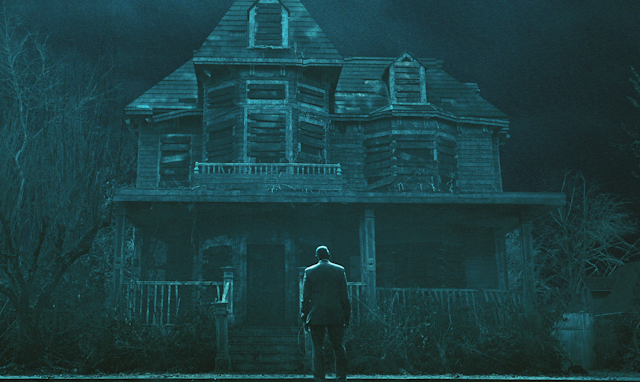This article contains spoilers
Edgar Allan Poe’s “The Fall of the House of Usher” (1839) is one of the most famous short stories in American literature. A tale of illness, psychosis and premature burial, the downfall of Roderick and Madeline Usher has horrified readers for generations.
Poe’s tale has now inspired a new Netflix series of the same name. The Fall of the House of Usher is an eight-episode anthology series by Mike Flanagan, the creator behind the streamer’s horror series The Haunting of Hill House (2018) and The Haunting of Bly Manor (2020).
Flanagan clearly has an intimate knowledge of the horror genre and a proven reputation as one of the foremost creative minds in the industry today. This new series should have been an ideal outlet through which to showcase Poe’s work for modern audiences.
There is nothing inherently wrong with drastically changing literary works in adaptations – as The Haunting of Hill House and The Haunting of Bly Manor are testament to. However, The Fall of the House of Usher incessantly remixes, grafts and merges references to Poe’s work to confusing effect.
Such trite references are so frequent that they’ve resulted in an incoherent show that misses many of the qualities of Poe’s work that continue to shock, frighten and fascinate.
Drowning in pointless references
The series depicts the rapid disintegration of the Ushers after they strike a Faustian bargain for fame and fortune with the mysterious Verna (a hackneyed anagram of “Raven”). The references to Poe, which are initially fun and engaging to identify, quickly become exasperating and exhausting to endure.
For example, the names of each of the Usher children – Frederick, Tamerlane, Victorine, Camille, Napoleon and Prospero – are taken from several tales and poems. These include “Metzingerstein,” “The Premature Burial,” “Tamerlane,” “The Murders in the Rue Morgue,” “The Spectacles,” and “The Masque of the Red Death.” Beyond featuring in these stories, these references largely lack real sense of purpose.
Their superficiality is compounded by the show’s depiction of Roderick Usher, who repeatedly recalls his former wish to be a poet. At numerous stages he recites, at length, verses from “Annabel Lee,” “The Raven” and countless more Poe poems that Usher is said to have composed.
I can only assume that these recitations were intended to show that, despite his lascivious disregard for humanity, Usher is still a vulnerable, disturbed, broken man worthy of our sympathy – sympathy which the series utterly failed to inspire within me.
The least successful episodes are “A Midnight Dreary” (episode one), “Goldbug” (episode six) and “The Raven” (episode eight). These bend and contort tales like “William Wilson” and, indeed, “The Fall of the House of Usher” itself, to fit the show’s pointed critiques of capitalist exploitation.
These episodes are hellbent upon comparing the Ushers with prominent, even infamous families such as the Rockefellers, the Trumps and the Sacklers. Yet, in that desperation, these episodes ensure that the essences of Poe’s original stories are, at best, corrupted and, at worst, entirely lost.
Two saving graces
The only episodes that seem to successfully use Poe’s work are “The Black Cat” (episode four) and “The Tell-Tale Heart” (episode five). These episodes are similar in that they centre around the psychological disintegration and violent deaths of Napoleon and Victorine Usher.
Like in Poe’s original tales, Napoleon and Victorine are plagued by their wrongdoings. Napoleon is tormented by a cat he gets to replace an identical-looking one he had accidentally killed. Driven to madness by the feline he goes on a destructive rampage and manages to kill himself. Victorine is plagued by the incessant sound of a beating heart after she tries to bypass usual medical research procedure, and also ends up killing herself.
Both episodes remain faithful to upholding Poe’s core themes of guilt, disgust and violence. They each speak to the horrors that people are capable of inflicting upon others, both human and animal.

The outstanding performances by Rahul Kohli as Napoleon and T’Nia Miller as Victorine expertly capture the sense of horror, paranoia and frenzy writ large within the original stories themselves. Crucially, these episodes are also the least preoccupied with mining Poe’s tales for references and, instead, set out to create gripping television.
If The Fall of the House of Usher serves any useful purpose, it is that Poe’s work will find a new generation of readers. Netflix have graciously provided viewers with a cheatsheet to the myriad references so audiences can work out which stories they should consume.
However, I can only hope that those readers approach his work on its own merits and don’t expect to find the series’s distortions and desecration reflected in their contents. Despite its potential, the series sacrifices the wonder and awe of Poe’s writing in order to tell a flimsy, unsatisfying story of power and greed.

Looking for something good? Cut through the noise with a carefully curated selection of the latest releases, live events and exhibitions, straight to your inbox every fortnight, on Fridays. Sign up here.

